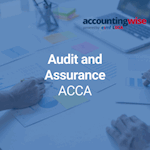ACCA – Audit and Assurance (AA)
The Audit and Assurance syllabus is essentially divided into five areas.
London Governance & Compliance Academy
Summary
Add to basket or enquire
Overview
The Audit and Assurance syllabus is essentially divided into five areas. The syllabus starts with the nature, purpose and scope of assurance engagements, including the statutory audit, its regulatory environment, and introduces governance and professional ethics relating to audit and assurance.
It then leads into planning the audit and performing risk assessment. The syllabus then covers a range of areas relating to an audit of financial statements including the scope of internal control and the role and function of internal audit. These include, evaluating internal controls, audit evidence, and a review of the financial statements. In addition to final review procedures, the syllabus concentrates on reporting, including the form and content of the independent auditor’s report.
Finally, the syllabus contains outcomes relating to the demonstration of appropriate digital and employability skills in preparing for and taking the AA examination. This includes being able to interact with different question item types, manage information presented in digital format and being able to use the relevant functionality and technology to prepare and present response options in a professional manner.
Qualification
ACCA Diploma in Accounting and Business (RQF Level 4)
Course media
Description
Syllabus structure
-
-
Audit framework and regulation
-
Planning and risk assessment
-
Internal control
-
Audit evidence
-
Review and reporting
-
Employability and technology skills
-
Main Capabilities
On successful completion of this subject, you should be able to:
-
-
Explain the concept of audit and assurance and the functions of audit, corporate governance, including ethics and professional conduct.
-
Demonstrate how the auditor obtains and accepts audit engagements, obtains an understanding of the entity and its environment, assesses the risk of material misstatement (whether arising from fraud or other irregularities) and plans an audit of financial statements.
-
Describe and evaluate internal controls, techniques and audit tests, including IT systems to identify and communicate control risks and their potential consequences, making appropriate recommendations. Describe the scope, role and function of internal audit.
-
Identify and describe the work and evidence obtained by the auditor and others required to meet the objectives of audit engagements and the application of the International Standards on Auditing (ISAs)
-
Explain how consideration of subsequent events and the going concern principle can inform the conclusions from audit work and are reflected in different types of auditor’s report, written representations and the final review and report.
-
Demonstrate employability and technology skills.
-
Who is this course for?
The ACCA qualification is ideal for people who want a career in finance and business.
Requirements
The Audit and Assurance (AA) exam is part of the Applied Knowledge Level of the ACCA qualification. If you are graduated with a degree accredited by ACCA you are exempt from this subject.
Questions and answers
Currently there are no Q&As for this course. Be the first to ask a question.
Reviews
Currently there are no reviews for this course. Be the first to leave a review.
Legal information
This course is advertised on reed.co.uk by the Course Provider, whose terms and conditions apply. Purchases are made directly from the Course Provider, and as such, content and materials are supplied by the Course Provider directly. Reed is acting as agent and not reseller in relation to this course. Reed's only responsibility is to facilitate your payment for the course. It is your responsibility to review and agree to the Course Provider's terms and conditions and satisfy yourself as to the suitability of the course you intend to purchase. Reed will not have any responsibility for the content of the course and/or associated materials.


